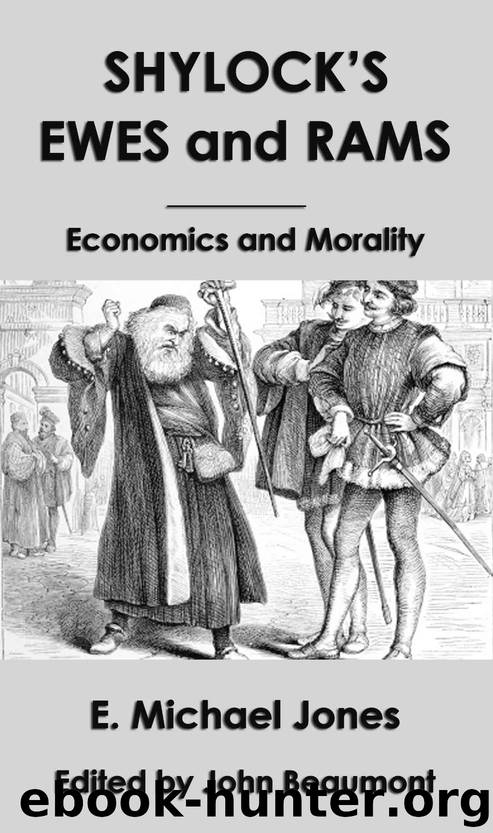Shylock's Ewes and Rams: Economics and Morality by E. Michael Jones

Author:E. Michael Jones [Jones, E. Michael]
Language: eng
Format: azw3
Publisher: Fidelity Press
Published: 2017-02-13T16:00:00+00:00
CHAPTER SEVEN
Riba vs. Mercy in The Merchant of Venice
The Merchant of Venice was probably written in 1595 or 1596, but there is no definite evidence of date. In The Occult Philosophy of the Elizabethan Age, volume VII of her Selected Works (1979), the historian Dame Frances Yates claims that Shakespeare’s Merchant of Venice was written in reaction to Marlowe’s Jew of Malta. By 1590 Marlowe had become a leader in the attack on judaizing cabalistic Puritanism. His response to the occult judaizing imperialist philosophy of John Dee, which provided the intellectual underpinning for Spenser’s Faerie Queene, was The Jew of Malta. Marlowe had already expressed his misgivings about British imperialism and magic in Tamburlaine and Dr. Faustus. Now he was expressing misgivings about the group which united those two enterprises, namely the Jews. The Jew of Malta was also an attack on John Dee, who introduced Cabala into English thought, especially into the thought of occult Puritans like Spenser.
Shakespeare’s Merchant of Venice attempted to ameliorate the portrait of the Jew that Marlowe painted by showing that the Jew’s unpleasant characteristics were the result of his treatment at the hands of Christians. The main character in The Jew of Malta is a merchant named Barabbas. The name is significant. Barabbas is the Zealot terrorist revolutionary who the Jews of his day chose over Jesus when Pilate offered to set Jesus free.
Barabbas is, then, the Jewish revolutionary, hoping to create heaven on earth through gold and conniving, practicing subversion in a way appropriate to times when Christians have political power but are threatened by enemies like the Turks. At the beginning of The Jew of Malta, Barabbas is surrounded by heaps of gold in his counting house, boasting about the superiority of Judaism to Christianity because of the riches which accrue from it.
Thus trolls our fortune in by land and sea,
And thus we are on every side enriched;
These are the blessings promised to the Jews,
And herein was old Abram’s happiness.
What more may heaven do for earthly man
Than thus to pour out plenty in their laps
Barabbas would rather be hated for his wealth than “pitied in a Christian poverty” because — and this should come as no surprise — “I can see no fruits in all their faith.” A Christian may live by his conscience, but “for his conscience lives in beggary.” The Jews, on the other hand, “have scrambled up/ More wealth by far than those that brag of faith.” The Jew’s wealth, in other words, is a proof, at least to him, of the falsity of Christianity.
Shylock, on the other hand, tugs at the spectator’s heartstrings and begs for sympathy. Shakespeare lends credence to the Jew-as-victim trope when he has Shylock say:
Hath not a Jew eyes? Hath not a Jew hands, organs, dimensions, senses, affections, passions? Fed with the same food, hurt with the same weapons, subject to the same diseases, healed by the same means, warmed and cooled by the same winter and summer as a Christian is? If you
Download
This site does not store any files on its server. We only index and link to content provided by other sites. Please contact the content providers to delete copyright contents if any and email us, we'll remove relevant links or contents immediately.
International Integration of the Brazilian Economy by Elias C. Grivoyannis(111061)
The Radium Girls by Kate Moore(12029)
Turbulence by E. J. Noyes(8051)
Nudge - Improving Decisions about Health, Wealth, and Happiness by Thaler Sunstein(7709)
The Black Swan by Nassim Nicholas Taleb(7130)
Rich Dad Poor Dad by Robert T. Kiyosaki(6636)
Pioneering Portfolio Management by David F. Swensen(6301)
Man-made Catastrophes and Risk Information Concealment by Dmitry Chernov & Didier Sornette(6019)
Zero to One by Peter Thiel(5802)
Secrecy World by Jake Bernstein(4753)
Millionaire: The Philanderer, Gambler, and Duelist Who Invented Modern Finance by Janet Gleeson(4478)
The Age of Surveillance Capitalism by Shoshana Zuboff(4293)
Skin in the Game by Nassim Nicholas Taleb(4250)
The Money Culture by Michael Lewis(4207)
Bullshit Jobs by David Graeber(4192)
Skin in the Game: Hidden Asymmetries in Daily Life by Nassim Nicholas Taleb(4007)
The Dhandho Investor by Mohnish Pabrai(3766)
The Wisdom of Finance by Mihir Desai(3748)
Blockchain Basics by Daniel Drescher(3583)
